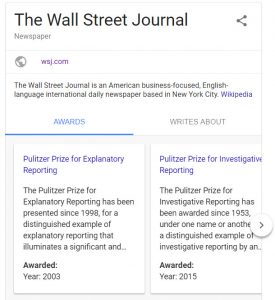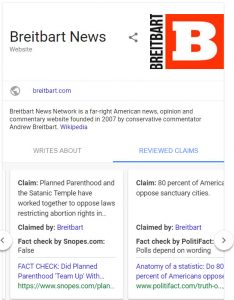 In its ongoing efforts to address the scourge of misleading and false news, Google recently announced a new feature that helps readers evaluate a news source they may not be familiar with. Now, when you search for a particular publication, the Knowledge Panel – that preformatted answers box that often appears at the top of search results – includes information about that publisher.
In its ongoing efforts to address the scourge of misleading and false news, Google recently announced a new feature that helps readers evaluate a news source they may not be familiar with. Now, when you search for a particular publication, the Knowledge Panel – that preformatted answers box that often appears at the top of search results – includes information about that publisher.
Depending on the publication, that can include awards they have won, the topics they cover most extensively and their political alignment. If content from the publication has recently been reviewed by an authoritative fact-checker, those items are also featured in the Knowledge Panel.
So, for example, if you Google “Wall Street Journal”, your search results page will include a Knowledge Panel like this:
You’ll see a one-sentence blurb from the Wikipedia article about the newspaper, links to professional awards for reporting, and a summary of the topics they have recently covered — in the case of the Wall Street Journal, that’s the Federal Reserve, advertising, sales and taxes… about right for a newspaper described as business-focused.
And if you Google “Breitbart”, your search results page will include a Knowledge Panel like this:
If you click the link for “Writes About”, you’ll see that Breitbart has recently covered Donald Trump, Barack Obama, the Republican Party and Hillary Clinton… what you might expect from what the Wikipedia article describes as a “far-right American news, opinion and commentary website”. But note the “Reviewed Claims” tab, highlighting reported facts that were then determined to be false by fact-checkers like Snopes, Politifact and FactCheck. This stands out as a concern — most news sources’ Knowledge Panels don’t include lists of reported facts that were questioned and reviewed by fact-checking sites.
This is a great way for librarians and information professionals to instill a little FUD (Fear, Uncertainty and Doubt) when their clients assume that whatever they see on their Facebook feed is reliable. And check out Vanessa Otero’s infographic, What, Exactly, Are We Reading?, a nice chart of where various media sources fall, both in terms of reliability/fabrication and liberal/conservative.




The truth is often sacrificed subject to the”facts” of the official narrative… i.e. Roswell, JFK Assassination, etc.. this is the slippery slope down to repeal our First Amamendent rights. Who will keep the so-called “fact checkers” honest?
Reminds me of a Star Trek episode where the inhabitants of a particular planet had their minds hooked up to an equivalent of the internet. They seemed to be intellectually brilliant. But they began to suffer loss of several important memories because someone was secretly tampering with the internet’s archives.
The best solution is for us to be able to check our own facts and still have tools that allows us to exercise our critical thinking skills for ourselves.
Wasn’t CBS News the news source that reported Tom Petty died hours before he actually died, because a source said and they didn’t fact check. Event this article is Fake news.